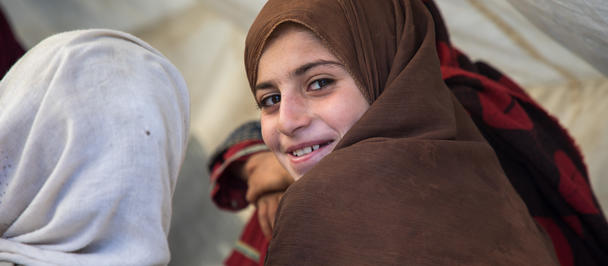What they couldn’t take
June 9, 2025

Jeannine, surrounded by other villagers, speaks out about issues women are facing since they have returned to the village.
The road into the village of Ntamugenga in North Kivu is no more than a stretch of dirt, winding between banana trees and old fields long overgrown. The land here carries memories of footsteps fleeing, of voices raised in warning, of homes emptied overnight. But it also carries the sound of someone still standing strong.
In Ntamugenga, Jeannine Bora stands out. Not because she seeks attention, but because of the assertiveness in her voice: firm, clear, unafraid. She does not recount her story for sympathy. She tells it because it is hers, and because it matters.

Jeannine Bora (right) speaks during a discussion between Ntamugenga residents, the village chief and UNDP staff.
“When the conflict came, we ran," she recalls. "There was so much shooting, we didn’t know where to go. I came back when I heard my mother was sick. Later, my husband came back but he had taken another woman. So I left again. I came here, to my mother’s house.”
Behind her, the remains of homes stand quiet. Rectangular mud structures, thatched roofs partly collapsed, walls cracked or fallen. A few still stand, others are patched with plastic or tin where possible.
“They have taken so much from us. But they won’t take everything.”– Jeannine Bora
Jeannine now lives with her sister and their children in what remains of their mother’s house. Inside, it is sparse: two small rooms, a plastic basin, a couple of battered pots, and a thin mattress laid under a frayed mosquito net. But it is swept clean, carefully kept. A quiet refusal to give in.

Jeannine stands with her sister and baby in front of their mother’s house, where they have taken refuge.
“This is where I sleep, with my children” she says, sitting on the mattress and brushing back a low-hanging mosquito net. “There is not enough space, but we manage. We don’t have any other choice.”
There is a hospital nearby. But for many, including Jeannine, access is not a matter of distance, it is a matter of money.
“If you’re sick, you need money. If you’ve been raped... you need even more. But we don’t have any. So we stay. We bear it.”
The words hang in the room. Not heavy. Not broken. Just real.

Jeannine sits on the mattress where she sleeps, surrounded by the few items she has saved.
Jeannine has seen women dragged into fields. She has run when unknown men appeared. She has held her children close, praying they would not be seen. She speaks of these things with the tone of someone who has moved past fear, into something deeper, quieter. A kind of enduring.
“They have taken so much from us,” she says. “But they won’t take everything.”
What remains is her will. Not grief, but resolve.
She remembers what life was like before. A small plot of land. Beans she grew herself. Selling them in Goma, earning just enough to feel independent. Useful. Proud.
Now, she works in neighbours’ fields. They give her food in return: some beans, a little cassava. It is not much. But it is something. Enough to cook. Enough to carry on.

Jeannine once cultivated her own small plot of land. Now she works in neighbours' fields in exchange for food.
In Ntamugenga and other communities in North and South Kivu, UNDP is starting early recovery programmes that will connect survivors to safe spaces, mobile health services and psychosocial support. Small grants and capacity-building will help women rebuild lost livelihoods. Networks will be strengthened to provide protection and solidarity. The aim: change that is not only urgent, but long-lasting and transformative.
Jeannine speaks of recovery in her own terms. Not in promises or plans, but in daily acts: standing up each morning, finding something to feed the children, keeping a roof – however fragile – over their heads.
She looks out through the doorway, toward the edge of the path where the yard meets the bush.
“We are still alive. They didn’t take that. They didn’t take my will to continue. I want to plant again. I want my children to grow without fear.”
Then she smiles. Not a smile of joy, but one of defiance. Of dignity that refuses to be erased.
Outside, the wind stirs the banana trees. The village is quiet. But Jeannine, in her stillness, remains unshaken.
What they couldn’t take is still here. Her strength. Her voice. Her future.


 Locations
Locations



